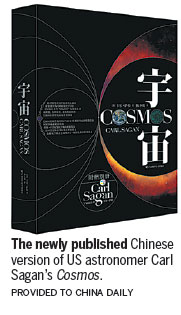His eyes blast lasers, while his catchphrase "billions" blazes across multicolored starbursts.
In another GIF, he placidly reclines and blows dried dandelion seeds into the air like a flotilla of parasols.
And in yet another, identical image of his own face blow out of his mouth like expanding bubbles.
Those are just some of about a dozen stickers of Carl Sagan I have on my phone.
Sagan is a household name in the West. Yet my son is, as far as I know, the only person with Sagan as a given name.
A shared interest in astronomer Carl Sagan helped me determine that my wife was the one. We agreed, after watching his Cosmos TV series repeatedly, that if we got married and had a son, we'd name him Sagan.
We did.
Fast-forward over a decade in space-time.

It was an honor to pose three questions as a panelist of the Carl Sagan Forum at the National Astronomical Observatory of China last week, focusing on popular-science communication.
First, why is Sagan such an enduringly popular figure in the West?
Second, why is he less known in China?
And, third, why has China yet to produce its own Sagan - that is, an internationally acclaimed popular-science communicator who has become a household name internationally?
The forum celebrated the release of the Chinese-language version of Cosmos - first published nearly four decades ago.
It's a book about science in which the "latest" discoveries are outdated. Yet it remains relevant.
Neil deGrasse Tyson remade the Cosmos TV series a few years ago to update the science.
For instance, black holes were theoretical when Cosmos came out. Now, we know there's one at the center of many galaxies - including a supermassive black hole around which our Milky Way curls.
But Sagan's particular personal popularity persists.
The smartphone stickers were created a few years ago and shared by people born long after he died. Why?
Largely it's because Sagan's scientific worldview survives beyond his life. It quests beyond updating our knowledge to the root of how we gain knowledge.
"Science is more than a body of knowledge. It's a way of thinking," he declared.
Mainstream Chinese society seems to agree. Then, why isn't Sagan a household name among Chinese? Why don't Chinese share Sagan memes with their friends on social media?
The translation of Cosmos is indeed a great stride forward, toward overcoming the historical, cultural and, especially, linguistic gaps.
This brings us to the third question - and its follow up - why hasn't China produced its own Carl Sagan - a popularscience communicator celebrated throughout the country and world? And how can it?
I believe it can. And should.
China has produced many world-class scientists.
But they have yet to accrue such worldwide celebrity as communicators.
Part of the reason, arguably, is they haven't actively engaged in personality-based science popularization via mass media.
They haven't become public figures - with their own TV shows, popular social-media feeds and books. China should work to actively cultivate such icons. And it can.
To this end, China may have to purposefully foster certain scientists' images not only as individual geniuses but also as public personalities.
I recently hosted a widely viewed short documentary about Chinese scientist Huang Danian. It racked up millions of hits in the country and abroad. The video was shown throughout Beijing's subway system.
However, it was perhaps only in Huang's passing that he received such public recognition. And he was celebrated more for his dedication to his projects and students than for promoting science among the public.
Surely, China's science can speak in new ways to all of what Sagan called "the pale blue dot".
Sagan likely never envisioned that internet memes of him would be shared after his death - since the internet itself was embryonic when he passed away.
China today needs to promote its showman scientists on social media.
Then, the country's breakthroughs can enthrall the imagination of "a mote of dust suspended in a sunbeam" - that is, the planet we share, Earth.
And we, as a species, may share funny stickers of Chinese scientists on our phones.
erik_nilsson@chinadaily.com.cn
